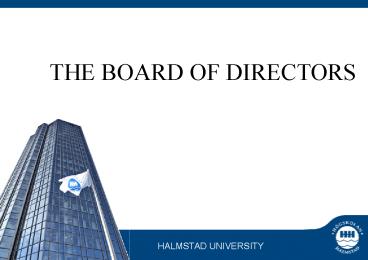HALMSTAD UNIVERSITY - PowerPoint PPT Presentation
1 / 20
Title:
HALMSTAD UNIVERSITY
Description:
accounting choice, auditing. E-mail: sven-olof.collin_at_hh.se. Home page: www.svencollin.se ... Advanced auditing. Strong markets. No owners with firm-specific ... – PowerPoint PPT presentation
Number of Views:115
Avg rating:3.0/5.0
Title: HALMSTAD UNIVERSITY
1
THE BOARD OF DIRECTORS
HALMSTAD UNIVERSITY
2
ME
Employed Sept, 1
- Sven-Olof Yrjö Collin
- Professor in Accounting/Corporate Governance
- Teaching Management Control, strategy,
scientific method, - corporate governance
- Research corporate governance, i.e., governance
of riding schools, - municipal corporations, composition of boards,
- accounting choice, auditing
- E-mail sven-olof.collin_at_hh.se
- Home page www.svencollin.se
- Third floor O-house
3
OPINION
- Considered important in reality
- every joint stock company, association and
other organisations - where the principal is separated from the
organisation have a board - Little empirically based knowledge
- (Black Box)
- Enormous amount of opinions
- Enormous demand of accountability
4
CORPORATE GOVERNANCE
Exogenous Forces, i.e., Environment Legislation,
culture, regulation, mass media etc
Governance Strategy
Corporate Governance Mechanisms Capital Manageria
l labour Executive compensation Board Auditors Str
ategy Structure Product market Part of the
Environment
Owner/ Principal of the Corporation
Corporate Entrepreneurship
Performance
efficiency
5
THE FORMAL STRUCTURE OF CORPORATE POWER
Shareholders or Members
Shareholder/Member meeting
majority
The board
majority
Other stakeholders
Top Manager of the firm
Auditors
The firm
6
A BOARD MODEL
Collin, forthcoming
Gabrielsson, forthcoming
Collin, 2007
Smith, 2007
7
THE FOUR FUNCTIONS OF THE BOARD
Principal
Conflict resolution
Monitor
Board of Directors
Decision
Resource provision
Agent
8
FUNCTIONS AND ACTIVITIES
Functions
Activities
Selecting/rewarding CEO, auditing Investments,
budget, strategy initiation Linking
networks, Co-opting Voting, coalition formation
Monitoring Decision making Resource
provision Conflict resolution
9
FACTORS INFLUENCING FUNCTIONS
Drivers
Functions
Activities
Selecting/rewarding CEO, auditing Investments,
budget, strategy initiation Linking
networks, Co-opting Voting, coalition formation
Board composition (insider/outsider, network
ties, market for directors, size, director
social/human capital) Environmental
uncertainty (technology change, political risk
etc) Organisational structure (F-,M-form,
complexity, size) Organisational strategy (org.
phase, life cycle, diversification) Societal
pressure (listed corporation) Distribution of
Property Rights (Joint stock, association etc)
Industry (professional, manufacture)
Monitoring Decision making Resource
provision Conflict resolution
10
SOME FINDINGS
- Monitoring reverse to Decision making
- Resource provision reverse to Decision making
- Conflict resolution independent, only related to
the principal - Praxis implication Functional harmony
11
WHO CONTROLS THE CONTROLLERS?
- The Market for Directors
- Auditors
- Business Press
12
THE COMPOSITION OF THE BOARD
- Whose interest?
- Who to select?
13
WHOSE INTEREST?
- Transaction specific investments
- to develop the investment
- Risk of exploitation
- open-ended contracts
14
BOARDS IN DIFFERENT GOVERNANCE SYSTEMS
15
SELECTION OF BOARD MEMBERS
- Market for Directors (reputation)
- Demographic similarity
- Network membership (Business groups)
- The myth of today
- GOOD GOVERNANCE INDEPENDENCE
- but
- what is INDEPENDENCE?
16
GROUP, TEAM OR HIERARCHY?
- Group serial group lining up with independent
interest except for the benefith of the
corporation (according to law) - Team Organic group, with dependencies and
solidarity, where the interest of the group could
be superior the benefith of the corporation - Hierarchy All directors are equal, but some are
more equal than others, i.e., a segmented
constellation where some individuals belong to a
group an some belong to a team
Teaminess of the board?
17
HIERARCICAL STRUCTURE OF THE BOARD
The gender distribution of the riding schools of
Sweden
Members 88
The board 74
Secretary 90
Treasurer 58
Governance
Structure
Chairwoman 49
Riding School Manager 95
Structure
Organisational
Instructors ?
18
Hypotheses of the boards gender composition and
its influence on corporate entrepreneurship
Risk behaviour Strategic opportunism
Degree of women at the board of directors
The gender characteristics will be less
influential when considering the overall gender
composition, more influential when considering
the gender of the figure head, and most
influential when considering the gender power
composition.
19
Analysis
The boards overall gender composition Gender
of the chairperson Degree of women concerning
the gender power distribution (treasurer,
chairperson and secretary)
Risk behaviour Strategic opportunism
Positive
20
THE END OF THE BOARD?
- Advanced auditing
- Strong markets
- No owners with firm-specific interest and
knowledge - Tecnostructure or the managerial revolution
- The nightmare of
- Berle Means (The modern corporation and
private property, 1932) - Burnham (The managerial revolution, 1941)
- Baran Sweezy (Monoploy capital, 1966)
- Galbraith (The new industrial state, 1967)































